Universal Spoiler Alert: Didn’t think too much of this film, so warning, spoilers throughout.
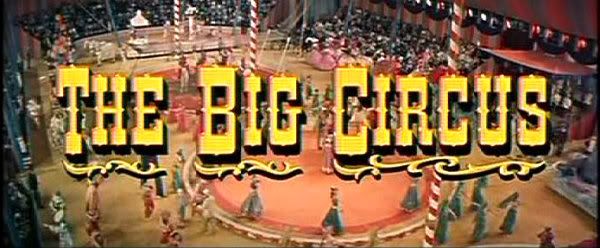
Having already provided me with a DVD-R of the Peter Lorre vehicle Mask of Dimitrios, long-time FoJ Roger H., then kindly volunteered to burn me a copy of another Lorre flick, The Big Circus. Sadly, while Mask of Dimitrios is one of the best Lorre features, Big Circus is just bland mush. The main reason why can be summed up in four words: Writer-Director Irwin Allen.
Allen later became associated with two genres. The first was science fiction, largely due to a spate of spectacularly inane TV programs during the 1960s. In the 1970s, meanwhile, Allen really made his mark as the foremost name in Disaster Movies, perhaps the decades’ trademark genre. Yet despite his The Towering Inferno being nominated for a Best Picture Oscar that year (!!!), Allen’s oeuvre has never risen about hackwork. Critic John Brosnan wrote in his book Future Tense, “Among those who have kneed science fiction in the groin, Irwin Allen must rank high.”
1959’s The Big Circus presumably was meant to evoke 1952’s The Greatest Show on Earth. The latter, directed by Cecile B. DeMille—sort of the Omega version of Allen—won that year’s Best Picture Oscar. Admittedly, this is considered sort of a travesty in retrospect, as the film beat High Noon and The Quiet Man for that honor. Even so, being a clearly cheaper, dingier version of a fondly remembered and regarded film wasn’t doing Big Circus any favors. (Although to be fair, it isn’t a monumental fiasco like Allen’s previous movie, The Story of Mankind.)
One big difference was in the cast. DeMille’s movie boasted Charlton Heston at his Ben-Hur era peak, James Stewart, Betty Hutton, Cornel Wild, Dorothy Lamour and Gloria Graham. It also featured a ton of real-life circus celebrities, including Emmett Kelly, the most famous clown since Pagliacci.
Big Circus boasts Victor Mature as the star, while second billing goes to…Red Buttons.* The film’s (supposed) female lead is Rhoda Fleming, with Kathryn Grant as the (supposed) second banana female. Admittedly, having Vincent Price and Peter Lorre in the cast sounds good, but they don’t do much. The ‘name’ cast is rounded out by erstwhile Cisco Kid Gilbert Roland, and Rickie Nelson’s even more nondescript brother David Nelson to bring in the kids or something. Oh, and Steve Allen has a brief cameo as himself.
[*To be fair, Buttons had won a Best Supporting Actor award two years earlier for Sayonara.]We open on the Whirling Circus (named for Mature’s character, whose persona can be summed up with ‘carries a Bat Masterson cane’), which is, for what it’s worth, the cleanest circus I’ve never seen. It also feature an eye-bleedingly gaudy primary color scheme. They’ve even painted all the elephants. This is all used to show off the film’s use of Cinemascope. The extreme widescreen is generally used, however, to array more actors into each shot. Lorre is often one of them, usually on the sidelines just looking on.
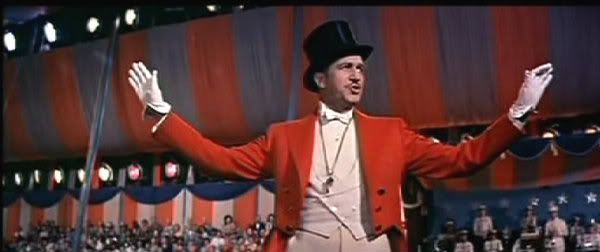
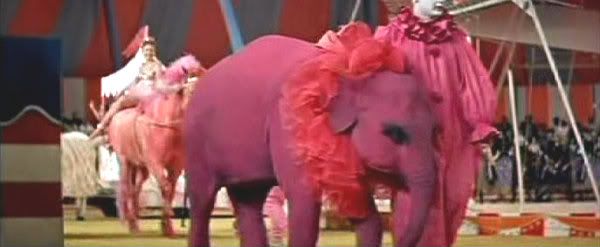
Ringmaster Vincent Price introduces “The Parade of the Nation,” which naturally has an Arab motif, and which is accompanied by a simply dreadful theme song that sounds like the Mormon Tabernacle Choir’s backup squad tackling a really bad Doris Day tune; “There’s nothing as gay / as spending the day at the ciiiir-cus!”
Then we see cover stories in Variety and Life Magazine (!!!!!!!!!!!!!!) about how Whirling has acrimoniously split from his former partner and present rival Something Bowman. As a result, Whirling is attempting to get a big loan from Faceless Bank Inc. He arrives at the bank in a circus parade, introducing Lorre as a sad clown named Skeeter. Don’t expect to hear a lot about him, he doesn’t do much.
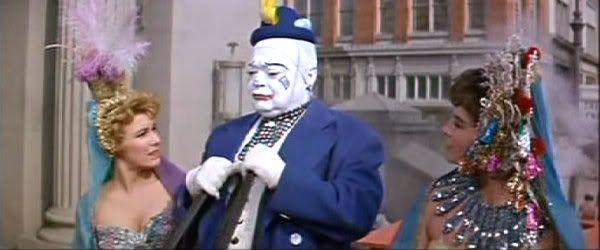
Peter Lorre deceptively takes center stage for a second.
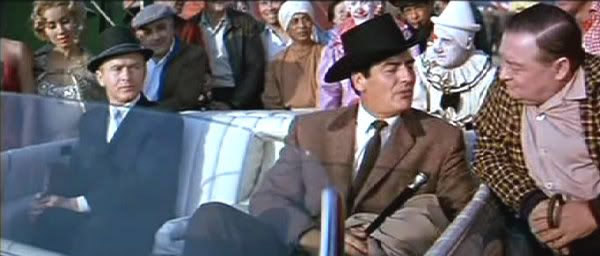
Ah, that’s more like it!
In order to get the loan, Whirling must take on one of the bank’s stuffy, straightlaced accountants, Red Buttons (I guess Tony Randall wasn’t available), to oversee the circus’ finances. Even worse, Buttons then hires hotshot PR agent Helen Harrison—good name, writers—to travel with the circus. Whirling is irate, because he doesn’t believe in women PR agents. Seriously. “[Whirling] believes you think like a man!” another woman warns Helen.
Despite the predictable obstacles and misunderstandings, Whirling and Helen will end up together, of course, pretty much because union rules demand it. Even the film seems bored by how perfunctory their romance is, and hence the real love story is between Buttons and Whirling’s sister, Jeannie (cute as a button Kathryn Grant). They get a lot more screen time than the films’ putative stars, which is good, because they’re at least 8% less boring.
All the generic ingredients are robotically mixed together; really bad comedy, an escaped lion, circus acts, trapeze artists, animals, etc. Helen and Buttons keep getting Whirling’s goat, because the former doesn’t have greasepaint in his blood and because Helen’s a woman doing a man’s job. At one point Buttons buys a *gasp* machine to raise the tents. I think it’s here that Whirling says something about how photos of this “couldn’t make the back cover of Repulsive Magazine!” There’s some good dialogue there, by cracky.
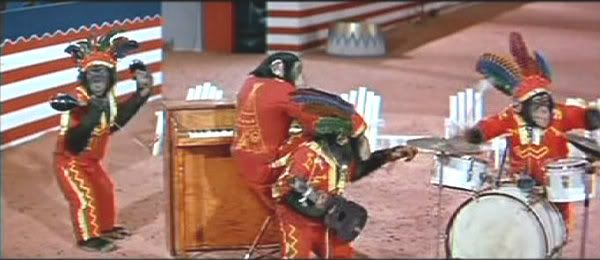
“…♫Take the last train to Clarksville, and I’ll meet you at the station♬…”
(I know, how do I come up with these brilliant, completely non-obvious gags?)
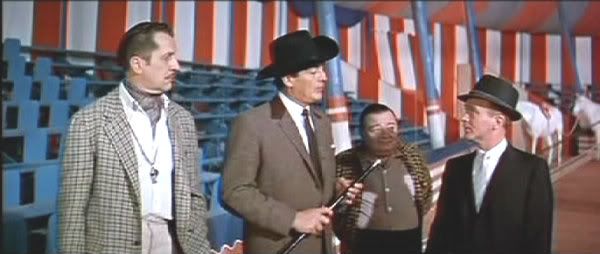
“Well, of course we look down on you! Look at you two, you’re like midgets.”
Whirling is aghast because the circus traditionally does this manually. Buttons is (hisssssss!) only interested in the fact that it’s cheaper and thus can help, you know, keep the circus in business. However, the human cost not only involves 40 men laid off, but the tents are also raised in each town with help from (really) local urchins who then get free passes. The kids are massively disappointed not to be so exploited, so Whirling has them water the elephants instead. Yay! Child endangerment is neat!
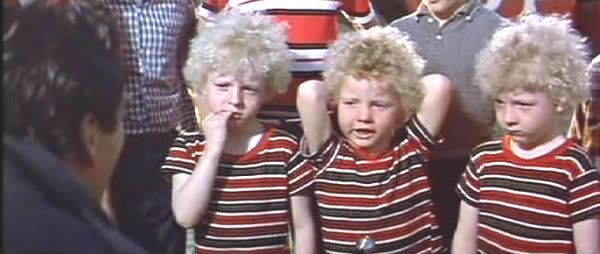
“Charles Dickens? Never heard of ‘im, Mister!”
The people we’re really interested in, Price and Lorre, don’t have a lot to do. As usual, Price seems to be enjoying himself hugely, and delivers his lines with his trademark plumy panache. His part is lackluster, but sadly Lorre’s is all but nonexistent. He generally just stands around, often in full clown make-up (he was fascinated by clowns, and thus doesn’t seem annoyed by this), and has almost nothing to do. Every once in a while he has a line, but nothing to speak of. Moreover, Lorre’s health wasn’t the best by this stage of things. Hopefully he enjoyed working on a project at least more opulent than most of his gigs then.
Lorre’s sole importance to the plot is when he gets drunk and, inevitably, Buttons takes his place in the big clown act. Yes, because that makes more sense than having one of the other, professional clowns take over. Luckily a stuffy accountant turns out to be such a natural acrobat, as well. Anyway, Buttons returns to his day job, but with a new appreciation for the circus and with new respect from his co-workers. Meanwhile, his budding, if boring, romance with Jeannie progresses apace. But getting back to Lorre, that means that his only real contribution to the plot is by omission. He gets drunk and doesn’t do his act. Wow, meaty stuff.
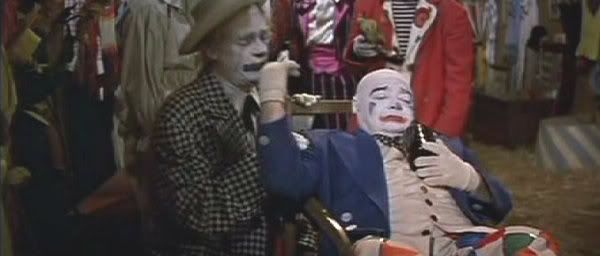
“Quiet, you. It’s my big scene! Here I go: ZZZZZZZZZZZZZZZZ“
With IT ALL ON THE LINE, the circus is soon afflicted with an ever more laughable, almost Job-like streak of bad luck. After the ESCAPED LION! there’s a FIRE! Then this turns out to be *gasp* SABOTAGE! Then the entire country, apparently (except for the parts rival Bowman is touring with his own circus) is drenched with NEVER-ENDING TORRENTIAL RAINS! The latter keeps crowds down across the country, meaning the circus is in severe danger of not meeting their loan obligations.
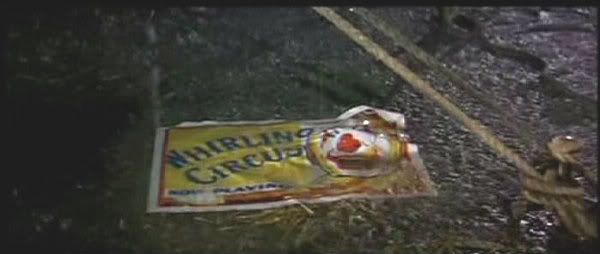
It’s a metaphor, get it?
Whirling, because he’s a big, zany devil-may-care dude, decides to roll the dice and do one last huge show in New York City to try to save the day. To bring out huge crowds, trapeze artist Gilbert Roland agrees to walk a tightrope over Niagara Falls. Then, again, DISASTER STRIKES!! Hilariously, a sooty Vincent Price comes running down the train tracks. The foreword train has crashed, he reports. That sounds like maybe the sort of thing you’d, you know, want to see in a movie,* but hearing it briefly described is still pretty awesome.
[*Just coincidentally, I’m sure, The Greatest Show on Earth featured a trainwreck, although they hamfistedly decided to actually show it in spectacular fashion. That DeMille chap had no sense of artistic minimalism at all.]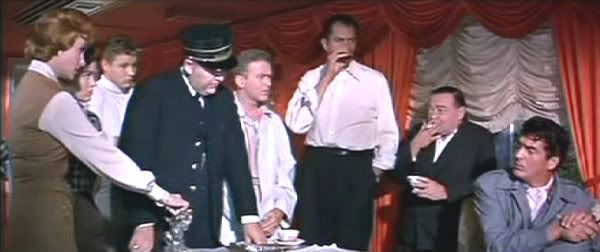
Master director Irwin Allen wrings out every dram of the epic potential of Cinemascope.
Even so, about the only effect of the wreck is to *gasp* kill Roland Gilbert’s wife, leaving him too shattered to continue trapeze-ing and tightrope walking. Whirling accuses him of being a coward, etc., and basically just acts like a complete douche. But it’s Tough Love, you see. If Roland doesn’t confront his fears blah blah. Roland responds by agreeing to do the walk over Niagara, but says he’ll kill Whirling afterward.
He *gasp* does the walk, which we see through some ludicrously awful backscreen effects.
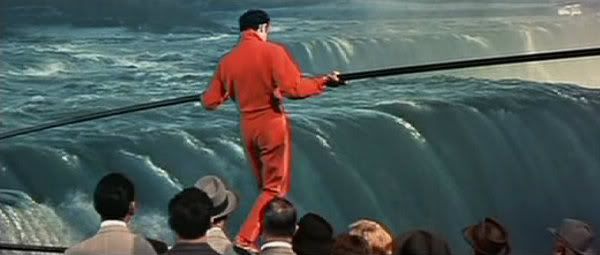

So is all well, now? No, because then the One Last Show is threatened by a SUBWAY STRIKE! Audiences won’t be able to get to the show!
Ugh, I don’t want to talk about this movie anymore. There’s a whole thing where the bank sends a new accountant (Floyd the Barber, actually) to serve papers to Whirling, and if he does he can shut down the One Last Show and Ruin Everything.
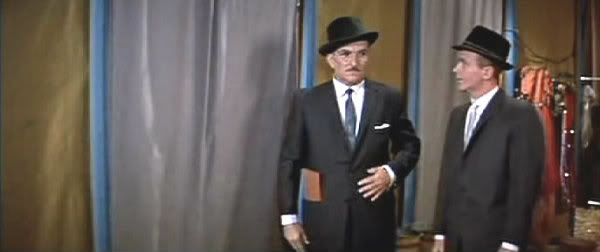
“Wait! I sense…somebody nearby needs a trim!”
Then about six plot threads are tied up in the last five minutes in about just about the most perfunctory fashion humanly possible, with several deus ex machinas being produced along the way. One is the bank one, because Whirling has gotten the Last Show telecast, and gotten a huge check from NBC (hence the Steve Allen cameo), and all is well. Yay! This is really, really dumb, since the whole time Whirling’s been dodging Floyd the Barber. Really, that’s what most of the last 20 minutes of the movie is about. But why did Whirling bother hiding when he knew he was getting the big check?
Oh, and the saboteur. Well, the obvious suspects were Price and Lorre, just because they were Price and Lorre. Then I thought about it for like a split second and considered which character had no apparent plot purpose at all, and thus immediately fingered the bad guy. Then I just had to wait an hour to see if I were right. I was.
It’s hard to like a movie when nobody involved seems to have given a rat’s ass about it. And it was co-produced by Victor Mature’s production company, so you’d think at least he’d care. I doubt Kathryn Grant did. This was basically her last movie. She married the 30 year older Bing Crosby and retired to raise their family. It’s not hard to believe she looked back at this uninspired hokem and was like, “Who needs it?”
I don’t know, maybe Lorre was happy being in clown make-up and drawing a paycheck (and like Buttons he would go on to work for Irwin Allen several times more), but for the Lorre fan, there’s not a lot here.
